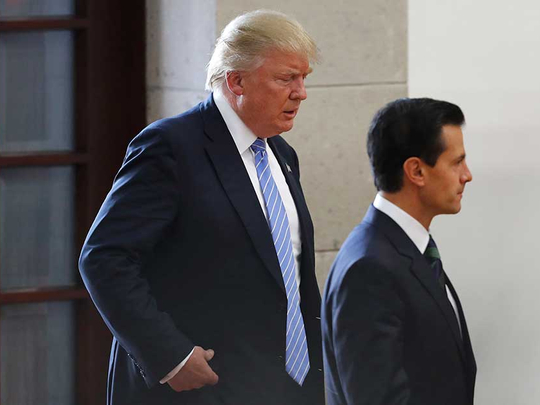
Chutzpah — a word naturalised in the English lexicon a long time ago, means to be insolent enough as to overstep the boundaries of accepted behaviour without fear of the consequences. In this regard, one may be reminded of Israeli Prime Minister Benjamin Netanyahu delivering that petulant speech to United States Congress in March 2015, in which he blasted US President Barack Obama for his “bad deal” with Iran. The term may have its etymological origin in Yiddish, the Germanic-based vernacular of Ashkenazi Jews in Central Europe, but nowadays you don’t have to be Jewish to evince it in your comportment.
In the Joys of Yiddish, Leo Rosten, the late American humourist and social critic, defined ‘chutzpah’ as “gall, brazen nerve, effrontery, presumption of arrogance such as no other word and no other language can do justice to”.
Since he announced his presidential campaign in the US in June last year, Republican nominee Donald Trump has shown himself to be not only an incorrigible narcissist with a raging ego, but a man possessed of an abundance of chutzpah. And he has it in spades. Last Wednesday, Trump arrived in Mexico and met the country’s President, Enrique Pena Nieto, a visit book-ended by a fundraising event in California and a speech on immigration in Arizona.
Mexicans, who of course revile Trump, were outraged by the news of his impending visit. This is a man, after all, who had labelled their compatriots living in the US as “rapists” and criminals”, called for a “deportation force” to remove all 12 million undocumented immigrants from the country “within 18 to 24 months”, and pledged to make Mexico pay for a 200-mile (322km) border wall. And beyond the outrage, Mexicans felt a sense of betrayal. “It’s a historic error, for you confront tyrants, you don’t appease them”, said Enrique Krauze, the well-known Mexican historian, essayist and public intellectual, summing up Mexico’s mood. Then he added, as he likened the meeting between the Mexican president and the chauvinistic American tycoon to the decision by Neville Chamberlain, the then British prime minister, to sit down with Adolf Hitler in Munich in 1938: “It isn’t brave to meet in private with somebody who has insulted and denigrated Mexicans. It isn’t dignified.”
As for President Nieto himself, whose poll numbers are reportedly the lowest among all Mexican heads-of-state in a quarter century, welcoming to the country an American presidential candidate who is vilified as an enemy of the people of Mexico, will probably do little to diminish his unpopularity.
It’s not unusual, of course, for American presidential candidate to visit foreign capitals during a campaign in order to bolster their presidential credentials. Obama’s visit to Berlin in 2008, for example, wowed the crowds with a historic speech akin to that of former US president John F. Kennedy’s own “ich bin ein Berliner” (“I am a Berliner”) address in 1963, while Mitt Romney’s visit to Palestine in 2012 only highlighted the Republican candidate’s utter ignorance of the status of Palestinians as a subjugated people after he asserted in a speech in occupied Jerusalem that Israel’s economic success, as compared to that of the Palestinians, was due to cultural differences” and to the “hand of providence”.
But candidates don’t just show up in a foreign land on whim with, literally, a few hours’ notice. Their trips are planned with the precision of a choreographer staging an intricate dance performance — and well in advance, where they are assured of a warm reception by the host country and its media. Trump’s trip was announced the night before his departure — a trip to a country whose leader had once compared the Republican candidate’s “strident rhetoric” to Hitler’s.
The visit was to take place in the frenzied build-up to his speech in Phoenix, Arizona, that same day, in which he was to clarify his tendentious immigration policy, but all eyes were on Mexico City. And it was a let down. A dud. A con. A lightning-speed hop across the border, where Trump sweet-talked the Mexican president and tried (imbued with chutzpah as he was) to make amends with people he had deeply hurt. Here’s trump speaking from a podium at the presidential palace: “I have a great feeling for Mexicans ... They are an amazing people ... An amazing people with strong values of faith and community ...”
Sure, sure, Donald, but the wall, what about the wall? “We didn’t discuss that”, he said.
For his part, President Nieto averred lamely: “My priority is to protect Mexicans wherever they may be. That is my responsibility. Mexicans in the US are an honest people, hardworking people who respect their families, their community and the law.”
Later, a contrite Trump tweeted: “I was so edified by my visit to Mexico that I now realise that everything I had said about Mexicans was wrong, reprehensible and unwarranted. I regret it all.” Just a joke, folks — which is what Trump and his supporters are. Perhaps, now that Americans have had their laughs, they can cease being the laughing stock of the global community.
Fawaz Turki is a journalist, lecturer and author based in Washington. He is the author of The Disinherited: Journal of a Palestinian Exile.









